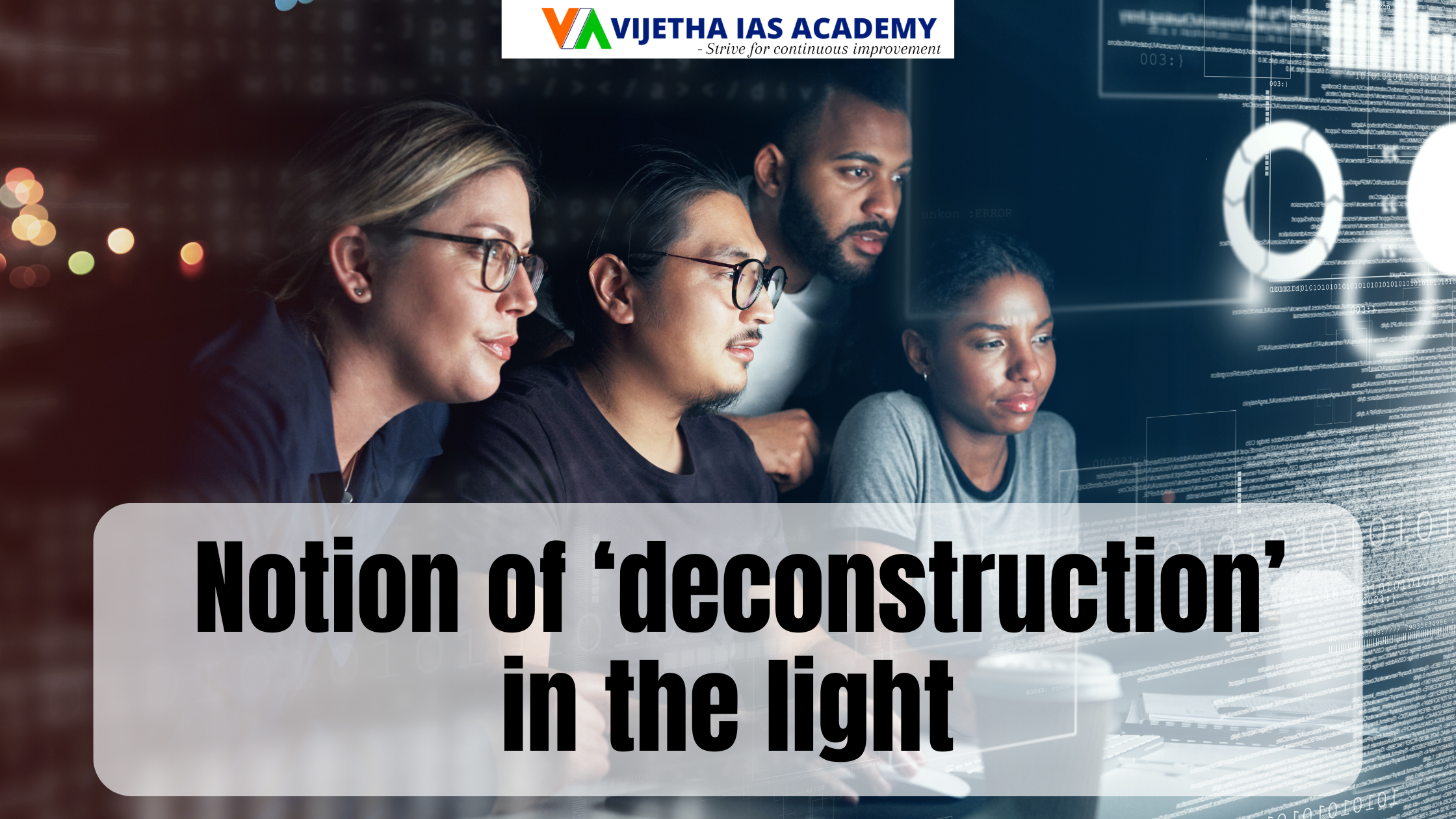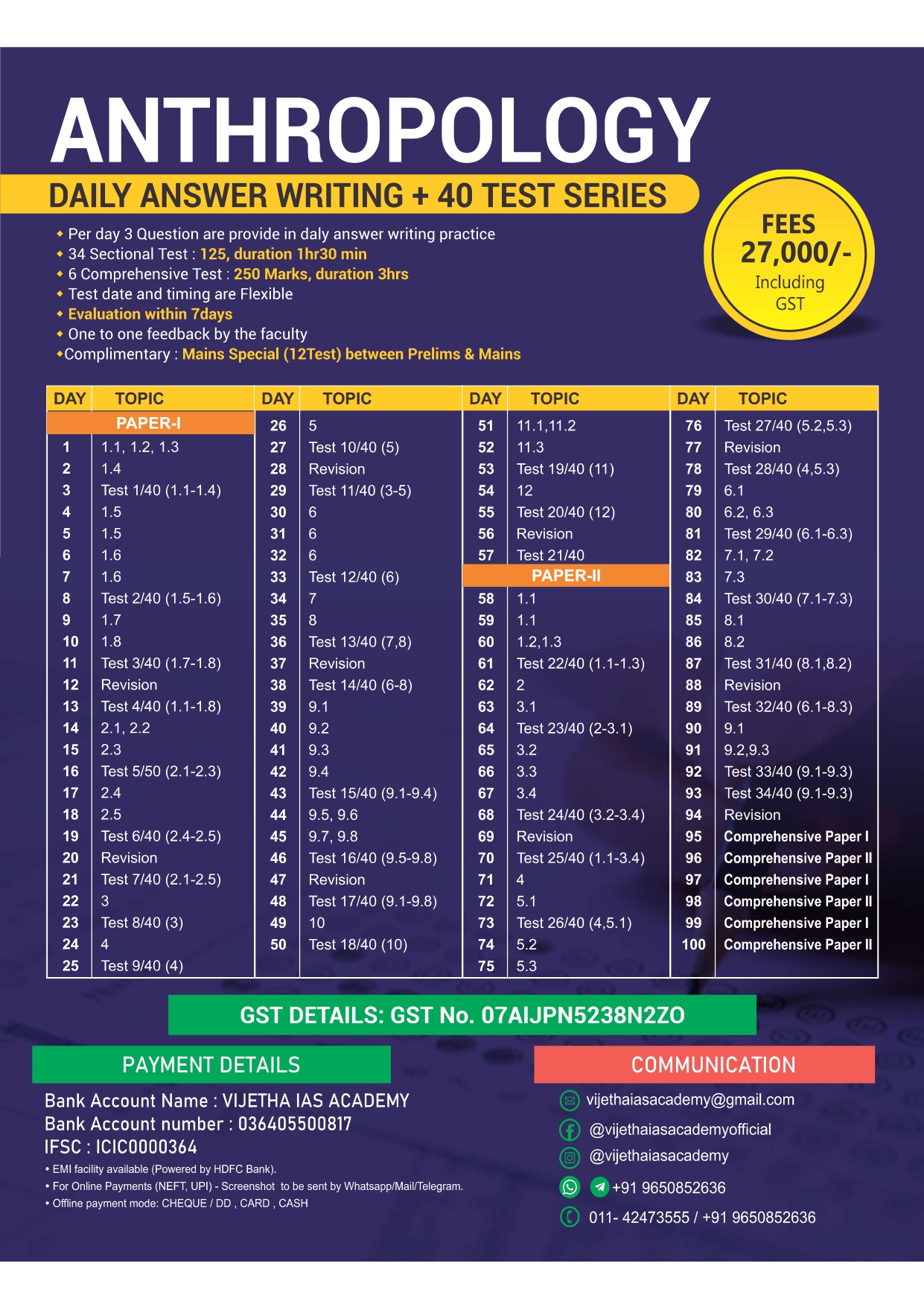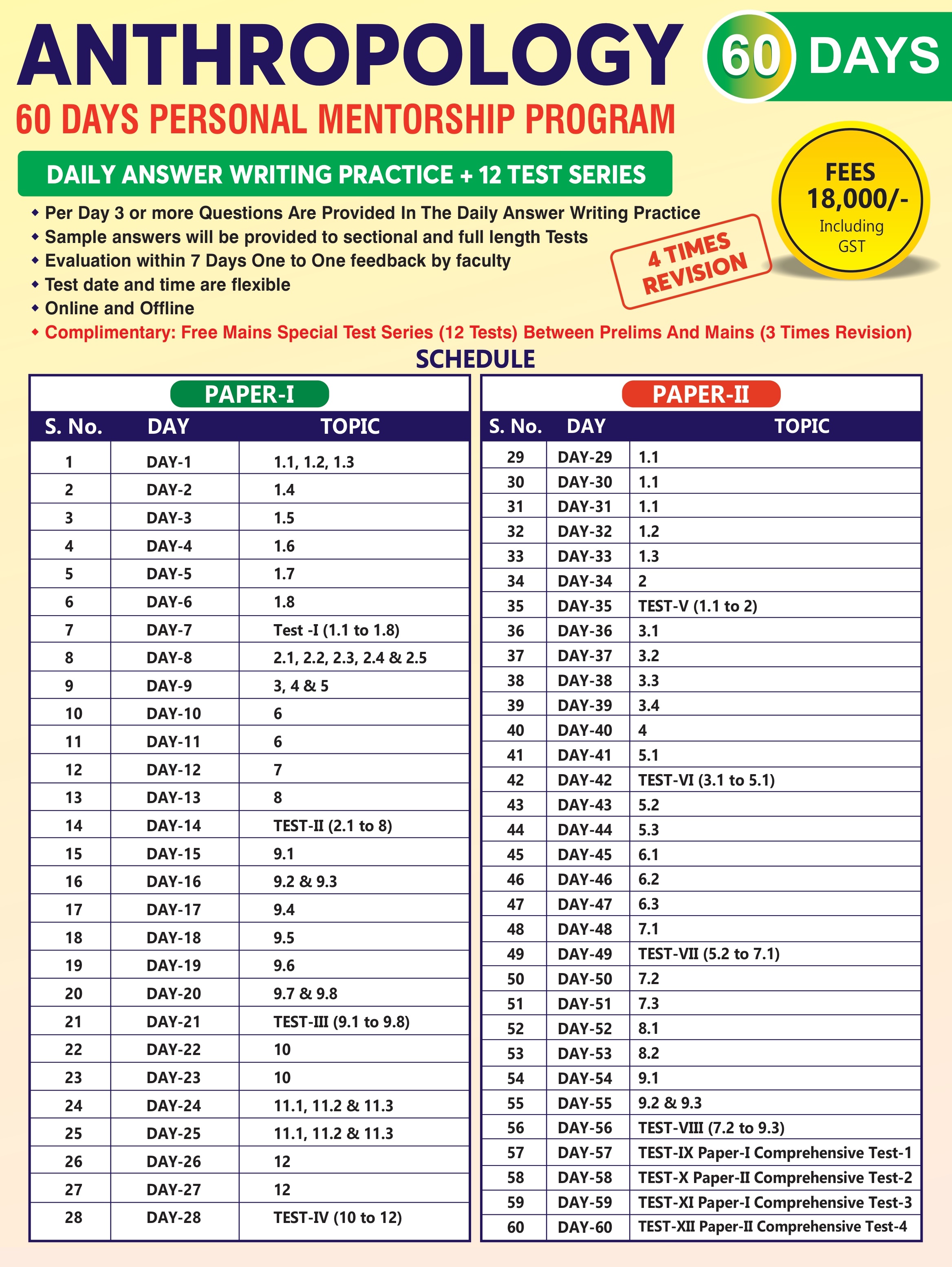
Critically explain the notion of ‘deconstruction’ in the light of the postmodern works of Jacques Derrida.
(20 Marks) Anthropology Optional Paper CSE 2024
Introduction
Jacques Derrida, a key figure in postmodern philosophy, introduced the concept of deconstruction as a critical approach to language, meaning, and interpretation. Emerging in the late 20th century, deconstruction challenges the foundational ideas of Western philosophy, particularly the notion that language can fully and transparently convey meaning. Derrida’s work is closely tied to postmodernism, which questions absolute truths, objective knowledge, and the stability of meaning.
Main Body
The Concept of Deconstruction
Deconstruction is not simply a method of critique but an approach to understanding how language constructs and disseminates meaning. Derrida argues that language is inherently unstable and meaning is always in flux. The relationship between the signifier (word) and the signified (meaning) is not fixed, which undermines traditional notions of binary oppositions.
Derrida’s concept challenges the idea of logocentrism, which prioritizes speech over writing and suggests that words have a direct, stable connection to their meaning. According to Derrida, meaning is never singular or static; it is always deferred, a process he refers to as différance. This means that interpretation is always incomplete, as meaning is constantly shifting and dependent on context.
Application of Deconstruction in Postmodernism
Challenging Western Metaphysics: Derrida’s deconstruction critically examines the Western philosophical tradition, which has long been dominated by binary oppositions. For example, in texts where concepts like presence are privileged over absence or reason over emotion, Derrida seeks to show how these hierarchies are artificial and contingent. Deconstruction reveals how meaning is constructed through exclusion and difference, not through fixed oppositions.
Textual Analysis: In his postmodern works, Derrida applies deconstruction to literary and philosophical texts, revealing the inherent contradictions and ambiguities within them. His famous deconstruction of Plato's "Pharmakon" in the text Plato’s Pharmacy highlights how a single term can carry multiple meanings (both medicine and poison), destabilizing the text’s supposed clarity. This analysis demonstrates how texts are never complete or self-sufficient, as they rely on interpretations that are fluid and variable.
Critique of Authority and Power: Deconstruction also critiques the structures of power and authority embedded in language and texts. It highlights how dominant interpretations suppress alternative meanings and marginalize voices that do not conform to traditional hierarchies. In this sense, deconstruction aligns with the postmodern critique of grand narratives and the questioning of universal truths.
Implications of Deconstruction
Destabilization of Meaning: By revealing the instability of meaning, deconstruction leads to the realization that all texts and systems of thought are open to multiple interpretations. This challenges the authorial intent and emphasizes the role of the reader or interpreter in constructing meaning.
Ethical Dimensions: Derrida’s approach has been extended into ethical and political realms. By deconstructing dominant narratives, it opens up spaces for marginalized voices and critiques established systems of power and oppression. Derrida argues that deconstruction promotes an ethics of responsibility, wherein one must always be open to alternative perspectives and meanings.
Criticism of Deconstruction: While Derrida’s work has had a profound influence on philosophy, literary theory, and anthropology, deconstruction has also faced criticism. Some argue that it leads to relativism or nihilism, as it seems to suggest that no interpretation or meaning is definitive. Others claim that deconstruction is overly abstract and lacks practical application, particularly in fields where concrete conclusions are necessary.
Conclusion
Derrida’s notion of deconstruction offers a radical way of questioning and analyzing texts, language, and meaning. In the postmodern context, it challenges established hierarchies, absolute truths, and binary oppositions, revealing the fluid and contingent nature of meaning. While it has been critiqued for promoting relativism and ambiguity, deconstruction remains an important tool for understanding how power, language, and interpretation intersect. Its relevance extends beyond philosophy, influencing various fields such as literature, cultural studies, and anthropology. By constantly interrogating the structures of meaning, deconstruction encourages a more inclusive and open approach to understanding human experience.
Anthropology Test Series Programme (Online + Offline))
We provide Anthropology Daily Answer Writing a range of programs designed to cater to various stages of UPSC preparation. Whether you're just starting out, have attempted the Mains before, or are getting ready for Mains 2024, we have the right option for you. Allow us to assist you in choosing the course that best fits your needs.
|
Level of Preparation |
Test Series Program |
Test Series Content |
Test Schedule |
|
Self-study of Anthropology Optional |
Anthropology 100 Days Personal Mentorship Program |
Daily answer writing, 34 sectional tests, 6 comprehensive tests, and complementary Mains Special 12 tests (between prelims and mains) |
|
|
Revise whole syllabus through Daily Answer Writing Practice and Tests |
Anthropology DAW Mentorship Program |
Daily Answer Writing Practice and 8 sectional and 4 Full Length tests |
|
|
Revise whole syllabus through Sectional and Full Length Tests |
Anthropology Tier- I T-40 Test Series |
34 Sectionals and 6 Full Length Tests |
|
|
Written Mains earlier and need more practice |
16-Anthropology Tier II Test Series |
10 sectional and 6 Full-Length Tests. |
|
|
Cleared Prelims 2023 and are preparing for Mains 2023 |
Mains Special 12 Tests program |
8 Sectional and 4 Full-Length Tests |
ANTHROPOLOGY MAINS SPECIAL COURSES
Enroll in our Anthropology Mentorship Program today and take the first step towards achieving your UPSC goals!
1) If you are going for Self study of Anthropology Optional and looking for a Comprehensive Program that includes Daily Answer Writing, 34 Sectional tests, 6 Comprehensive tests, and Complementary mains special 12 tests (between prelims and mains), our Anthropology 100 Days Personal Mentorship Program is the perfect choice.
2) If you want to revise Whole Syllabus through Daily Answer Writing Practice and 8 sectional and 4 full length tests, then our Anthropology DAW Mentorship Program is the best fit for you.
3) If you want to revise Whole Syllabus through 34 Sectionals and 6 Full Length Tests then Anthropology Tier- I T-40 Test Series is for you.
4) If you have written Mains earlier and need more practice, then our 16-Anthropology Tier II Test Series is a great option. This test series includes 10 sectional and 6 full-length tests.
5) if you have cleared Prelims 2023 and are preparing for Mains 2023,our Mains Special 12 Tests program is a must-have. This program includes 8 sectional and 4 full-length tests to help you prepare for the big day.
For more information on Vijetha IAS Academy’s Anthropology mentorship programs Deatils : https://vijethaiasacademy.com/anthropology-test-series
Anthropology 100 Days Personal Mentorship Program ( 7 + 3 Times Revision )

Anthropology 60 Days Personal Mentorship Program ( 4 + 3 Times Revision )

For more information: https://vijethaiasacademy.com/anthropology-test-series
Details Of Anthropology Classes Program
Top Anthropology Optional IAS Coaching Center in Delhi Vijetha IAS Academy | Best Anthropology Optional IAS Coaching in Delhi
Fee Structure:
- Tier 1: Rs. 55,150/- (3 Years Validity of Offline/Live Batch)
- Tier 2: Rs. 42,000/-
- Tier 3: Rs. 36,000/-
Batch Size: 50 – 60 Students
UPSC Notes
Anthropology Optional IAS Coaching Notes, IAS Exam Preparation Booklets, IAS optional coaching Notes, UPSC Coaching Notes, Video Lectures, Live Classes with faculty, Chat Facility Available
Teachers Name: N P Kishore Sir
Past Result
- Last Years Result 2023
- 35 Total Selections in CSE 2023
Google Reviews: 4.9 out of 5 stars
Website: Vijetha Anthropology Optional IAS Coaching in Delhi (https://vijethaiasacademy.com)
Faculties of Vijetha IAS Academy
- N P Kishore Sir
Features
- Vijetha IAS Academy offers Online and offline Courses for better preparation of Anthropology Optional Strategy for UPSC in Delhi.
- For better Anthropology optional Exam Preparation, Vijetha IAS Academy Delhi Conducts the Motivational IAS Session.
- Vijetha IAS Academy provides you with the CASE STUDIES on the pattern of the real-time IAS Exam which is helpful for better preparation of the Best Coaching for UPSC Anthropology Optional Optional IAS Examination.
- DAW & WAW – Revision Through Daily & Weekly Answer Writing Practice is offered by Vijetha IAS Academy for better result of the Anthropology Optional IAS examination.
Advantages of joining Vijetha IAS Academy
- Best Faculties for Anthropology Optional IAS Coaching in Delhi
- Best facilities, infrastructure and updated Case Studies Booklets and Notes for better preparation of the Anthropology Optional IAS Examination in Delhi.
- Best result in Past years for Anthropology Optional Strategy for UPSC Examination in Delhi
- Best Rated coaching institute for Anthropology Optional IAS Examination in Delhi.
- Vijetha IAS Academy also provides recorded lectures videos, notes which is very helpful for better preparation of Anthropology Optional IAS Coaching in Delhi
Fees Structure of Vijetha IAS Academy
|
Tier 2 |
Tier 1 |
Tier 3 |
BATCH STARTS FROM |
|
42,000/- |
55,150/- (3 Years Validity Offline/Live Batch) |
36,000/- |
REGISTRATION – START |
Fees Structure of Vijetha IAS Academy
|
Course Name |
Fees Amount |
Course Duration |
|
GS Offline (Pre + Mains+ CSAT) with Essay+Answer Writing |
Rs.99,000 (Including GST) |
400+ Days |
|
GS Online |
Rs.18,999 (Including GST) |
400+ Days |
|
GS Mentorship Programme |
Rs.29,999 (Including GST) |
1 Year |
For more information on our courses, visit our Anthropology Courses page. Explore our Test Series and Online Courses for flexible learning options.
Vijetha IAS Academy
Add. 2nd Floor, 50, Shankar Road, Block 7, Old Rajinder Nagar, Rajinder Nagar, New Delhi, Delhi 110060
MOB. 096508 52636
Open 7 Am : Closes 9 PM
Keywords: anthropology 2024 question paper, Anthropology optional subject question paper 2024, Anthropology optionals 2024 question paper, Anthropology Optional Coaching UPSC, Vijetha IAS Academy Anthropology, Anthropology crash course UPSC, Anthropology daily answer writing UPSC, Kishore sir Anthropology, Harappan maritime trade, Indus Valley trade networks, ancient economic systems.
